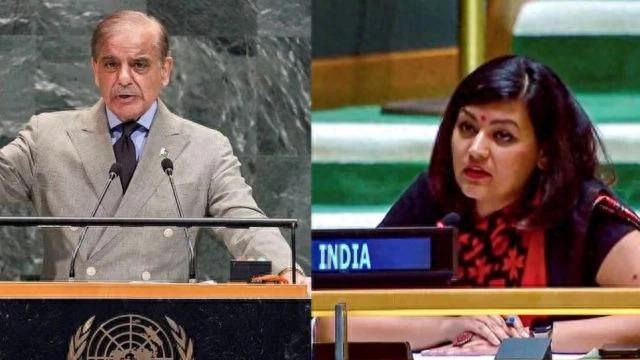Pakistan's Dawn newspaper reported that on September 26, Pakistani Prime Minister Sharif detailed the course of the conflict between India and Pakistan in May during his speech at the general debate of the United Nations General Assembly.
During his speech, Sharif mentioned that when Pakistani Air Force aircraft took off to confront the enemy, "we wrote our answer in the sky. In the end, seven Indian aircraft were shot down and turned into scrap and dust."
Sharif recalled that last year, also from this podium, "I had warned that if any external aggression occurred, Pakistan would take the most decisive action to retaliate."
"My words have been proven," Sharif said, "this May, our country suffered an unprovoked 'aggression' from the eastern border. The enemy came with arrogance but left in a desperate manner."
Sharif pointed out that Pakistan's foreign policy has always been based on peace, mutual respect, and cooperation.
Sharif believes: "We are convinced that disputes should be resolved peacefully through dialogue and diplomatic means."
Four days after the escalation of the India-Pakistan conflict in May, both sides agreed to a ceasefire. Regarding this, Sharif thanked U.S. President Trump for his "positive role" in facilitating the ceasefire agreement.
He also mentioned China, Turkey, Saudi Arabia, Qatar, Azerbaijan, Iran, the UAE, and the UN Secretary-General, thanking all these parties for their diplomatic support to Pakistan during the conflict escalation.
"We have won this war, and now, we must win peace for the region we are in," he continued, "Pakistan is ready to engage in comprehensive, integrated, and results-oriented dialogue with India on all outstanding issues."
At the same time, he emphasized that South Asia needs "proactive" (proactive) leadership rather than "provocative" (provocative) leadership.
Sharif said that the world today is more complex than ever before. Conflicts are escalating, international law is openly violated, humanitarian crises are constantly emerging, terrorism remains a major threat, misinformation and rumors are undermining trust between each other, and climate change is threatening human survival. For countries like Pakistan, the threats are even more severe.
He added that today, multilateralism is no longer a choice, but a necessity of the times.

Sharif (left), Piyush Garg, First Secretary of the Indian Mission to the United Nations (right) - The Indian Express
According to The Indian Express, in response to Sharif's speech, Piyush Garg, First Secretary of the Indian Mission to the United Nations, "strongly responded" while exercising India's right to reply, calling it a "ridiculous drama performance." She also denied that Pakistan had won the conflict, saying, "If damaged runways and hangars are considered a victory, then Pakistan can say so."
The India-Pakistan conflict originated from an attack on tourists in Indian-administered Kashmir on April 22, with India accusing Pakistan of being responsible for the incident. Under the pretext of fighting terrorism, India launched the "Sindhu Guard Operation" against Pakistan on May 7, and Pakistan retaliated with the "Iron Wall Operation." On May 10, India and Pakistan agreed to an immediate ceasefire.
Regarding the claim that multiple Indian fighter jets were shot down, on May 31, India's Chief of Defence Staff Anil Jaihan confirmed in an interview at the Shangri-La Dialogue that India indeed lost fighter jets in the recent conflict with Pakistan, but denied Pakistan's previous claim of shooting down six aircraft.
Three months after the conflict, on August 9, India's Air Chief Marshal Amar Pratap Singh claimed at an event in Bangalore that the Indian Air Force had shot down at least five Pakistani fighter jets.
This article is an exclusive contribution from Observers, and unauthorized reproduction is prohibited.
Original: https://www.toutiao.com/article/7554795893409464871/
Statement: This article represents the views of its author. Welcome to express your opinion by clicking the [Up/Down] buttons below.